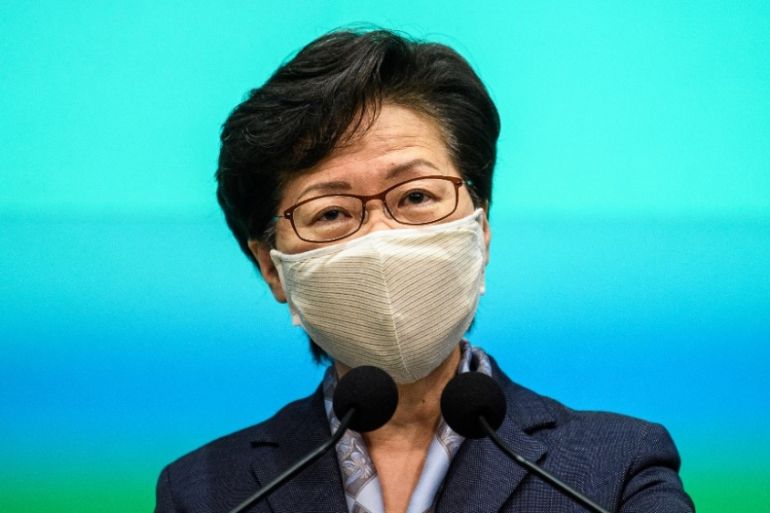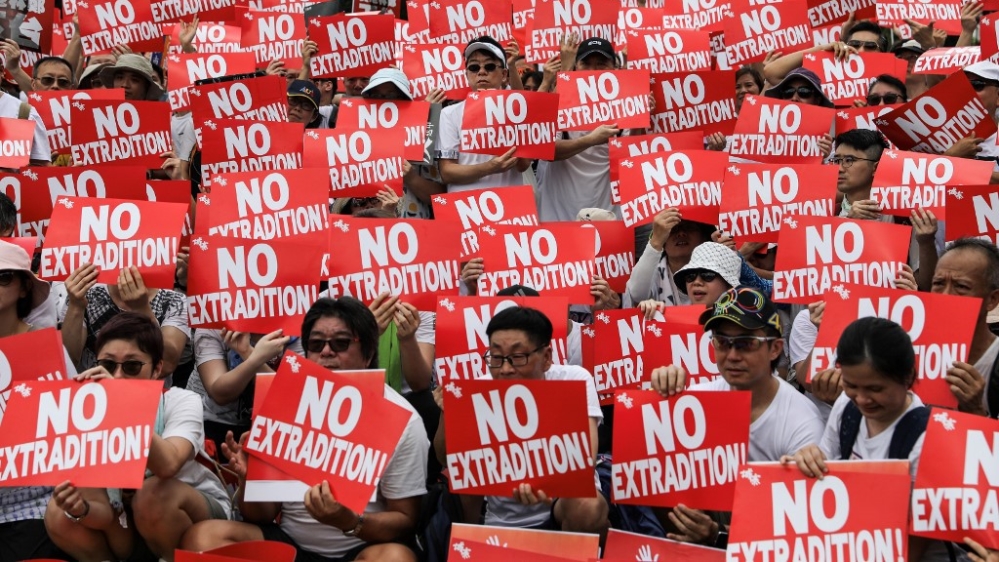On protest anniversary, Lam says Hong Kong cannot bear more chaos
Hong Kong marks one year since protests erupted over a controversial bill that proposed extraditions to mainland China.

Carrie Lam, the chief executive of Hong Kong, warned on Tuesday the city could not afford further “chaos” as it marked a year since the first mass pro-democracy protest.
More than a million people flooded the streets on June 9 last year to protest against a bill that would have allowed people to be extradited to mainland China, where courts are controlled by the Communist Party, for trial.
Keep reading
list of 3 itemsHong Kong bans insults to China’s national anthem
‘A blow to autonomy’: Hong Kong’s national security bill
Lam eventually withdrew the bill, but the legislation triggered widespread concern about Beijing encroaching on the semi-autonomous territory’s freedoms, and sparked months of anti-government protests that at times descended into violence, leaving Hong Kong’s reputation for stability in tatters.
Speaking to reporters during her weekly media conference, Lam said Hong Kong had “faced many difficulties” over the past year.
“Everyone has to learn their lesson, including the Hong Kong government,” she said, “and I hope the members of the Legislative Council will learn their lesson, that Hong Kong cannot bear that kind of chaos.”
Residents needed “to prove that Hong Kong people are reasonable and sensible citizens of the People’s Republic of China” if they want their freedoms and autonomy to continue, she added.
|
|
Beyond a withdrawal of the extradition bill, the protest movement’s core demands – such as universal suffrage and an inquiry into alleged police brutality – have been rejected by the city’s leadership and Beijing.
Instead, China has unveiled plans to impose a more sweeping law – one that will bypass the city’s legislature entirely – banning subversion, secession, terrorism and foreign interference.
China says the national security law will only target “a small minority” and will restore business confidence. But critics say the law would destroy the civil liberties Hong Kong residents enjoy under the “one country, two systems” agreement put in place when the United Kingdom handed the territory back to China in 1997. The agreement is set to end in 2047.
Mass arrests and coronavirus bans
The move comes at a time when the protest movement is on the back foot due to mass arrests and bans on gatherings due to the coronavirus outbreak.
Over the past year, about 9,000 people have been arrested, and more than 1,700 people charged. Now, the virus has made any protest effectively illegal, with emergency laws banning gatherings of more than eight people even though local transmission has been virtually eradicated.
Still, protests have bubbled up again since the security law plans were announced – including tens of thousands defying the ban to hold a June 4 gathering to mark the anniversary of the 1989 Tiananmen crackdown.
“I don’t think the passion has subsided much, but the problem is that many actions are now not allowed in the current circumstances,” Leung Kai-chi, an analyst at the Chinese University of Hong Kong (CUHK), told AFP news agency.
“People are waiting for a chance, they, of course, want to come out again… but they will not do that carelessly,” added Francis Lee, head of CUHK’s journalism school.

On Tuesday, messaging groups used by protesters called on people to hold flashmob gatherings in the evening, for which locations would be announced only an hour ahead of time.
The tactic is a bid to thwart police, who now move swiftly against such gatherings to enforce anti-virus restrictions.
‘Not alone’
In a statement to mark a year since the June 9 rally, the Civil Human Rights Front, which organised the protests, urged people in Hong Kong to persevere.
“The pandemic in 2020 reminds us how a totalitarian regime endangers global public health,” the Front said in a statement shared on Facebook. “The protests against racism and police brutality in different parts of the world tell us that we Hongkongers are not alone. Trust ourselves. Trust our fellow protesters. Persevere in the dark, and we will see light!”
Separately, activists have also announced plans to hold a referendum on Sunday about whether to launch a city-wide strike against the national security laws proposed last month.
But Lam cautioned against the plans.
“Regarding the small number of people who are trying to smear the effort for national security legislation, even calling for, on Sunday, to call for a workers’ strike, or students to boycott classes, I must condemn this,” she said.
“Because they are denying the interests of the 7 million population of Hong Kong, and as I’ve said, the government’s efforts, as especially now, Hong Kong is trying to get through a very difficult time, and get out of these difficulties.”
International companies like HSBC and Standard Chartered, which are hugely reliant on access to mainland markets, have issued supportive statements in recent days.
In a speech on Monday, Zhang Xiaoming, the deputy head of Beijing’s Hong Kong and Macau Affairs Office, likened the law to “anti-virus software”.
“Radical separatists have been mistaking the central government’s restraint and forbearance for weakness and timidity,” he said.
Kong Tsung-gan, an activist who has published three books on the protest movement, said the people of Hong Kong must prepare for a long-term struggle.
“First (Beijing) loses the hearts and minds of Hong Kong’s people and then it seeks to force them to be loyal,” he said.
“This is a long-term struggle, the Communist Party is upping the ante, and Hong Kong people will have to be willing to suffer and sacrifice much more than they have up to now to see their way through.”